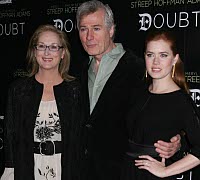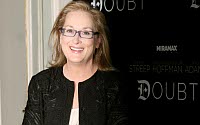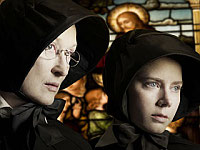 Speaking for the nuns
Speaking for the nunsMeryl Streep, Amy Adams and John Patrick Shanley share their Doubt



MERYL STREEP
22.Jun.49, Summit, New Jersey








AMY ADAMS
20.Aug.74, Aviano, Italy
JOHN PATRICK SHANLEY
3.Oct.50, The Bronx, New York
Filmography as screenwriter...
THE RED COAT (2006)
CONGO (1995)
WE'RE BACK! (1993)
ALIVE (1993)
JOE VERSUS THE VOLCANO (1990)
THE JANUARY MAN (1989)
MOONSTRUCK (1987)
FIVE CORNERS (1987)

 On the London stop in their press tour with Doubt, Meryl Streep, Amy Adams and John Patrick Shanley look a bit worn out, but still ready to face the press and talk about their movie. It's the middle of awards season; Bafta nominations have just been announced, with Oscar nods still to come. And even through the fog of jet lag, they constantly bring us back to the film's strong themes. This makes the interview a bit more serious than usual, especially for a Meryl Streep press junket.
On the London stop in their press tour with Doubt, Meryl Streep, Amy Adams and John Patrick Shanley look a bit worn out, but still ready to face the press and talk about their movie. It's the middle of awards season; Bafta nominations have just been announced, with Oscar nods still to come. And even through the fog of jet lag, they constantly bring us back to the film's strong themes. This makes the interview a bit more serious than usual, especially for a Meryl Streep press junket.They're all dressed in blacks, whites and greys, to match the film's poster behind them. Amy is an elegant redhead, a bit shy and actorly. John is relaxed and chatty and intensely serious about his material. And Meryl warms up as usual, keeping us entertained with her sharp comments, lively wit and hilarious eye-rolling sighs. We start by talking about the words...
John: Most modern plays don't translate well to the screen, because the economics of modern theatre is that we write plays that have only two characters in them! And Doubt is no exception - it had four characters, and so to turn that into a feature film required standing back from the dialog and looking at the story as a separate object, rotating it in your hands and finding the way in. But in the film I could include the kids in the classroom and the congregation and the boy who's at the centre of contention. And I can also show the voyeuristic things that one wants to see - how the nuns live in the convent and the priest in the rectory and the difference between those lifestyles.

I’m intimidated by me - well, the thing that they think is me!
Meryl: I'd seen the play years before with my friend Cherry Jones in what I thought was the definitive portrayal as Sister Aloysius, and I thought it was a great, great, great play. And I never told you that, John! And I realised that just as I was saying this. But I never thought it would be made into a movie until John called and said, "Let's have lunch and talk about it." But my first thought was for Cherry - why wasn't she doing it because she was so amazing? And John explained that, besides financial considerations, there was the fact that he hadn't directed that production, and he wanted his own hands on it. And I thought that was really valid. And I sure would like a crack at Sister Aloysius! And like all really good pieces of literature, I knew this could hold a lot of different interpretations, over and over again. You'll see a lot of different kinds of interpretations of Sister James and Mrs Miller, but I'm really proud of what we did.
Was this more dramatic role a scary leap for you, Amy?
Amy: I think it is any time you put yourself out there as an actor and try to step outside what people know you as, or your comfort zone. And of course stepping into a room with Meryl Streep, Philip Seymour Hoffman and Viola Davis. These are amazing actors not only on film but on stage, and I was really excited for the challenge. Yes, I have a lot of fear, but I love to challenge myself so I saw it as a great opportunity.
Do you look at Meryl and think maybe you'd like to that kind of career?
Amy: Of course she's a exquisite role model, but there's only one Meryl Streep! And she has the career that she has, and I would never try to have anyone else's career. Sure I was intimidated to work with her, but Meryl is one of the most warm, witty and funny people that I know and that I have worked with. So whatever intimidation was there was purely created by my own insecurities. I have to say it's not easy playing anything, no matter who you are, but for my character, I was playing being intimidated. Once we were there and we were in it, we were playing out characters and saying these words. Meryl wasn't Meryl. I wasn't looking at her as the goddess that she is! I was looking at the brilliant scene partner and a wonderful support on set.
The boys in the cast probably weren't as intimidated by your career as Amy was.
Meryl: That's very true. Kids aren't impressed by anything. But you know, all they wanted to talk about was The Devil Wears Prada, because they'd all seen that. But I didn't want to talk about that in the habit, you know? But you know, I'm intimidated by me - well, the thing that they think is me! No not intimidated by it, but exhausted by it. But it goes away in the process of working, because actors want to clear away anything that's extraneous.

I prefer for people to see what I really look like to keep the expectations low
Meryl: Well, I had a great deal of old-age make-up on! [raucous laugh] And the prosthetics - that nose! But you know, the really freeing thing about playing these characters - speaking for the nuns - is that you throw away everything women normally waste a great number of hours of the day on: what you're going to wear, how your hair looks, how your face is, the state of disarray. Everything is gone. And it's probably the way we should be, instead of wasting a lot of time on the things that get you ahead in the world! But it was very liberating, and sort of spiritual, if I dare use the word.
Amy: I concur! I've had that question a lot, and in my own life, when I'm not in front of y'all - I'm using that word too much. I'm not even Southern; I don't know what's happening! But I don't really wear a lot of make-up in my own life so I've never been afraid to show that side of me on screen. I prefer for people to see what I really look like to keep the expectations low. That's what I look like; I accepted that a long time ago.
John, you've said Sister James was based on one of your teachers as a kid. What about other influential teachers you've had?
John: I've had a lot of teachers from John Millington Synge to Shakespeare to Charles Dickens to Dylan Thomas. Teachers don't have to be alive. All the teachers I've had who were alive who were influential to me were thrown out of the schools they taught in. And they were thrown out for deviant behaviour, although they weren't particularly deviant towards me. And that influence has a lot to do with the fact that I'm unable to judge people. The jury's always out and the deliberations continue; I'm no fit person to judge, and yet I must continue to accrue evidence and come up with ever new theories about why people do what they do.
How did you research the role of Sister Aloysius?
Meryl: I visited two retirement homes, and had a couple of meals with nuns. And it was really great - they were mostly in their 70s, 80s and 90s. Retirement homes aren't usually described as happy, but these two retirement houses were filled with people who were happy. They were with their family - with their sisters - they were all productively engaged in some kind of work. None of them were retired, they were still tutoring kids, visiting the bereaved, they in communities.

When I wrote the play, I felt very much like the voice crying in the wilderness
Meryl: A lot of things happen in a film outside what is written. As an actor, it's great to know that there's possibility in what you can bring to even a script that's densely and tightly knit. In this, John allowed there to be breath in the scenes - the pauses and the places where atmosphere takes over. On the airplane, I never watch movies with headphones - I hate that feeling of those things in my ears. But it's amazing how much you can understand what's happening in a really good movie that's well-edited. No offence!
John: I can live with that! I could tell even if there was no sound in this movie that you and Father Flynn didn't get along.
The world changed between the time when you wrote the play and made the film.
John: It's funny, when I wrote the play, I felt very much like the voice crying in the wilderness. Because I wrote the play during the invasion of Iraq. And now I feel like everybody's in doubt, and the schism has evaporated - I felt like doubt was being undervalued as a paradigm of wisdom, and now I don't. Now I feel there's a hunger for discourse on the international level, and there's much less of an us-and-them feeling, and more of a feeling that we're all in a jam and wed better start talking to each other. Everybody's sort of shrugging their shoulders and saying, "I'm not sure what we should do. I guess we all better pitch in." There's no one person who's saying, "I've got all the answers," and there's no hunger for that person to arise. So I think this is an anti-ideological moment, and hooray!
How do you feel about having double competition from Kate Winslet for the Bafta?
Meryl: [heavy sigh] Well, as you can imagine all day this has come up. And I have to say it's just so much more fun to publicise a film in July, because you talk about the film. You don't talk about a horserace. It's a different thing altogether. You have to do the marketing, jockeying between studios, campaigns. It's a political thing. Having said that, I think Kate Winslet is great; I'm glad she wasn't in three movies this year!
CLARIDGES, LONDON, 16 JAN 09
HOME | REVIEWS | AWARDS | NEWS | FESTIVAL | Q&A | ABOUT | TALKBACK







